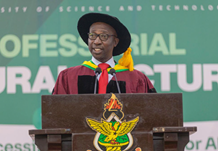By Elizabeth PUNSU, Kumasi
Professor of chemistry and Vice-Dean of the Faculty of Physical and Computational Sciences at Kwame Nkrumah University of Science and Technology (KNUST), Professor Nathaniel Owusu Boadi, has underscored the transformative potential of nanotechnology in advancing green energy solutions in Ghana and across Africa.
Delivering his Professorial Inaugural Lecture at KNUST, Prof. Owusu Boadi noted that nanotechnology – often referred to as ‘the science of the invisible’ – holds the key to creating more efficient, affordable and sustainable energy systems.
His lecture, titled ‘Toward accessible green energy for all: harnessing the power of the invisible giants’, traced the evolution of nanomaterials from their historical origins to their cutting-edge applications in modern energy technologies.
According to him, nanotechnology can significantly enhance the performance of solar cells, improve battery efficiency and advance fuel cell technologies – all of which are essential for transitioning to a greener, more resilient energy sector.
“Despite the abundance of sunshine in Ghana and many African countries, access to solar energy remains limited due to the high cost of conventional silicon-based solar cells. Nanomaterials offer a promising alternative that could lower costs and improve efficiency, making solar energy more accessible,” he noted.
Prof. Owusu Boadi called on government to invest heavily in research and development of nanomaterials for energy generation.
He also urged regulatory bodies such as the Environmental Protection Agency and Ghana Standards Authority to establish science-based safety guidelines for the production, use and disposal of nanomaterials – ensuring alignment with international best practices.
He further proposed the establishment of a National Nanotechnology Research Centre, to be spearheaded by the Ministry of Environment, Science and Technology (MEST) in collaboration with the Ministry of Finance, academia and industry stakeholders.
This centre, he explained, would drive homegrown innovations and facilitate commercialising nanotech-based energy solutions tailored to Ghana’s needs.
Prof. Owusu Boadi also highlighted the broader applications of nanotechnology beyond energy. In healthcare, nanomaterials support early diagnosis through advanced imaging and contribute to tissue regeneration.
In environmental science, they are used for water purification and hazardous waste cleanup. The electronics and textile industries also benefit through faster semiconductors, precision sensors and smart, antibacterial fabrics.
Further, Prof. Owusu Boadi indicated that though Ghana has made impressive strides in electrification – achieving an 85.1% access rate as of 2022 – many rural communities still lack reliable power.
Across sub-Saharan Africa, an estimated 600 million people remain without electricity. He asserted that this gap presents both a challenge and opportunities.
“By investing in nanotechnology, Ghana can lead in developing sustainable, locally-driven energy solutions that not only close this gap but also position the country as a hub for green innovation,” he emphasised.
Professor Nathaniel Owusu Boadi – professor of chemistry and Vice-Dean of the Faculty of Physical and Computational Sciences, KNUST.










